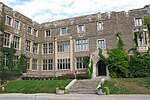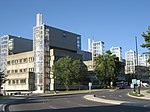McMaster Faculty of Engineering
Engineering universities and colleges in CanadaMcMaster University
The McMaster Faculty of Engineering is a faculty located at McMaster University in Hamilton, Ontario. The faculty was established in 1958 and was the first engineering program to developed problem-based learning curriculum. It currently has seven departments in chemical engineering, civil engineering, computing and software, electrical and computer engineering, engineering physics, material science and engineering and mechanical engineering. The faculty offers bachelors, masters, and doctoral degrees. The faculty is home to 1 Canada Excellence Research Chair, 13 Canada Research Chairs, 4 Natural Sciences and Engineering Research Council chairs, and 14 Endowed Chairs.
Excerpt from the Wikipedia article McMaster Faculty of Engineering (License: CC BY-SA 3.0, Authors).McMaster Faculty of Engineering
College Crescent, Hamilton
Geographical coordinates (GPS) Address Nearby Places Show on map
Geographical coordinates (GPS)
| Latitude | Longitude |
|---|---|
| N 43.26076 ° | E -79.92047 ° |
Address
John Hodgins Engineering Building
College Crescent
L8S 4M1 Hamilton
Ontario, Canada
Open on Google Maps



